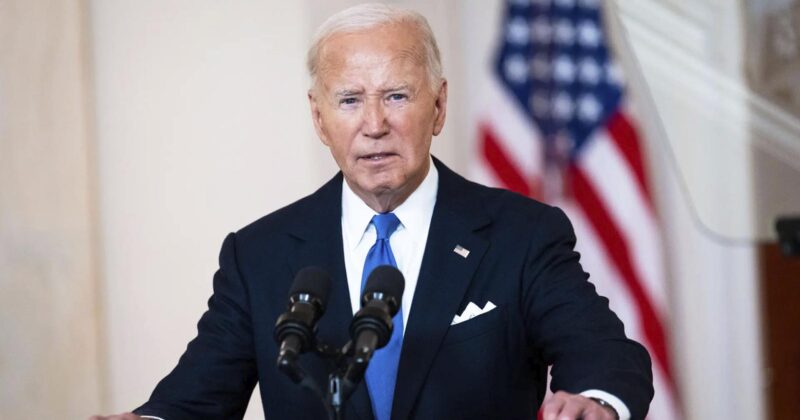Without much fanfare, President Joe Biden signed 50 bills into law on his last Christmas Eve in the Oval Office – ranging from establishing the first federal anti-hazing college campus standard, to making the Bald Eagle the country’s first official bird, to preventing federal agencies from issuing “useless reports” (by who’s standard?).
The bills also named federal buildings and post offices, a law to hold youth treatment and care centers more accountable, and a law which precludes members of Congress from collecting pensions if convicted of crimes.
The Epoch Times has more detail on some of the bills:
SB 4610 designates the bald eagle as the national bird, clearing up what has been assumed but not codified for nearly 250 years.
The bill, co-sponsored by Sens. Amy Klobuchar (D-Minn.), Cynthia Lummis (R-Wyo.), Markwayne Mullen (R-Okla.), and Tina Smith (D-Minn.), was passed by the Senate in July and by the House Dec. 16.
It states “bald eagles are a historical symbol of the United States representing independence, strength, and freedom; the bald eagle is unique to North America; the bald eagle image remains the leading insignia for all branches of the United States military.”
It notes that on June 20, 1782, the bald eagle was adopted as the Coat of Arms for the United States Great Seal but there was never any formal language encoded to designate it as the national bird.
The new law remedies that by amending Chapter 3 of Title 36, United States Code to state, “The bald eagle (Haliaeetus leucocephalus) is the national bird.”
Senate Bill 1351, the “Stop Institutional Child Abuse Act,” creates a federal work group on youth residential programs to oversee the health, safety, care, treatment, and placement of minors in rehab and other programs.
The bill had 24 bipartisan cosponsors and was adopted in the House, 373-33, on Dec. 18, after the Senate passed the bill by unanimous consent.
The bill was notable for the personal involvement of socialite and activist Paris Hilton, who testified before the House Ways & Means Committee in July about mistreatment and abuse she claims to have experienced in treatment centers.
House Bill 5646, the “Stop Campus Hazing Act,” co-filed by Reps. Lucy McBath (D-Ga.) and Jeff Duncan (R-S.C.) and 57 co-sponsors, passed both chambers in unchallenged voice votes.
The act, spurred by a North Carolina State University report that hazing is rampant on many college campuses, requires federally funded higher education institutions to disclose hazing incidents reported to campus or local police authorities in their annual security reports beginning Jan. 1, 2025.
The president also signed SB 932, the “No CORRUPTION Act,” co-sponsored by Sens. Jacky Rosen (D-Nev.), Rick Scott (R-Fla.), and Josh Hawley (R-Mo.), which disqualifies a member of Congress “convicted of crimes related to public corruption” from receiving their retirement payments.
The bill—in long form, the “No Congressionally Obligated Recurring Revenue Used As Pensions To Incarcerated Officials Act”—was adopted in the Senate in July and by the House on Dec. 16.
It eliminates a loophole that allowed members to continue receiving checks while exhausting appeals, an exploitable oversight exposed by the investigation into Sen. Bob Menendez (D-N.J.). Menendez was found guilty in July of accepting bribes in exchange for using his political influence
HB 5301, the “Eliminate Useless Reports Act,” seeks to streamline federal reporting processes by requiring federal agencies to file a list of outdated or duplicative plans or reports in their annual budget justifications.
The bill was introduced in 2023 by Rep. Robert Garcia (D-Calif.) with support from co-sponsors Reps. Glenn Grothman (R-Wis.) and Chuck Edwards (R-N.C.), adopted by the House in November, the Senate on Dec. 11.
The president signed a slate of bills renaming local postal offices in Texas and California. A San Francisco post office will be renamed in honor of the late Sen. Dianne Feinstein (D-Calif.), who passed away in September 2023.

